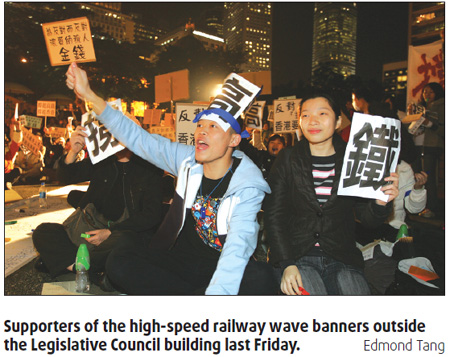HK's new rail link a money machine
Updated: 2010-01-19 07:11
By George Ng(HK Edition)
|
|||||||

High-speed railway to fuel biz, pare HK$87b in time costs in 50 yrs
HONG KONG: With the Legislative Council's approval of the HK$67 billion funding for the proposed express-rail link project over the weekend, Hong Kong has taken a significant step in strengthening its ties with economic development of the mainland.
Despite the huge amount of public money involved in the project, many experts believe the tangible and intangible economic benefits from the link will more than compensate for that cost.
For the quantifiable economic benefits, the government said there would be HK$87 billion over 50 years in terms of time savings to passengers.
However, it is the indirect benefits - albeit less quantifiable - that will take Hong Kong to a higher level.
"It is hard to quantify all the benefits. However, we can expect to see a tremendous increase in economic activities with the commission of high-speed rail link," said Daniel Chan, a senior strategist at DBS Bank.
After linking up the national high-speed network in 2015, it will take only 14 minutes to travel from Hong Kong to Shenzhen, 48 minutes to Guangzhou, five hours to Wuhan and 10 hours to Beijing.
With the distance between Hong Kong and major mainland cities being shortened, the city will act more like a national business hub, adding to its current status as an international financial center.
"Hong Kong will benefit from the link in the same way London benefits from the trans-continental express rail in Europe," said Chan.
He noted that the status of Tokyo, Osaka and Nagoya as national business hubs has also been strengthened by the bullet trains that run between all major Japanese cities.
"Like the airport, it is not only for Hong Kong residents. The main role of the airport is for international connection and that for the high-speed terminal is for connecting to the domestic market of the mainland. Our residents may benefit from it, but it is our economy that benefits most," said professor Anthony Yeh, head and chair professor at the Department of Urban Planning and Design of the University of Hong Kong.
Yeh argued that the shortened distances mean a significantly larger hinterland for Hong Kong's economic development.
With Guangzhou serving as the southern hub of the national high-speed network in the future, the high-speed rail link will also shorten the distance between Hong Kong and the natural resources-rich western regions of the country. With the link, the city's hinterland will expand to include the whole country, Yeh said.
Hong Kong businessmen can then extend their manufacturing bases to the central and western regions, where labor costs are lower, he said.
Meanwhile, products and services provided by Hong Kong businessmen will more easily get into these markets of great potential, he added.
The link will also unlock the huge market potential that the large population in the central and western regions poses for Hong Kong's tourism and related sector.
The availability of a comfortable, yet economical means of travel will encourage more residents in the central regions to visit Hong Kong, many of whom have shunned the city, said Michael Wu, Chairman of the Travel Industry Council of Hong Kong.
Mainland visitors to the city last year totaled 17.7 million, accounting for 60 percent of the total visitor arrivals of 29.6 million during the period, according to data from the Hong Kong Tourism Board.
Currently, the majority of mainland visitors come from the Pearl River Delta region. The high-speed rail will help expand the source market for Hong Kong's tourism sector, said Michael Li, executive director of the Federation of Hong Kong Hotel Owners.
While no estimate of the potential increase in mainland visitors is available now, commuter data collected from the Beijing-Tianjin high-speed rail link provide a reference.
The Beijing-Tianjin link, which shortens the trip between the two cities from two hours to 25 minutes, has helped increase traffic between the two cities, with 20 million commuters having ridden on the link in its first year of operation, the Ministry of Railways said.
Visitors to Tianjin last year increased by 20 percent, while revenue generated by the local service sector rose 15 percent over the first three quarters, the ministry said.
The high-speed rail will prove to be competitive against air travel, Dr Chan Yan-chong, an economic and management expert at the City University of Hong Kong told China Daily.
"The advantage of air travel over high-speed rail in terms of time savings will be compromised if you include the time needed to go to the airport and the time needed for the airplane to take off and land," he said.
The lower cost of travel by high-speed rail will prove to be a good tradeoff for the longer time needed for a trip, he predicted.
(HK Edition 01/19/2010 page4)